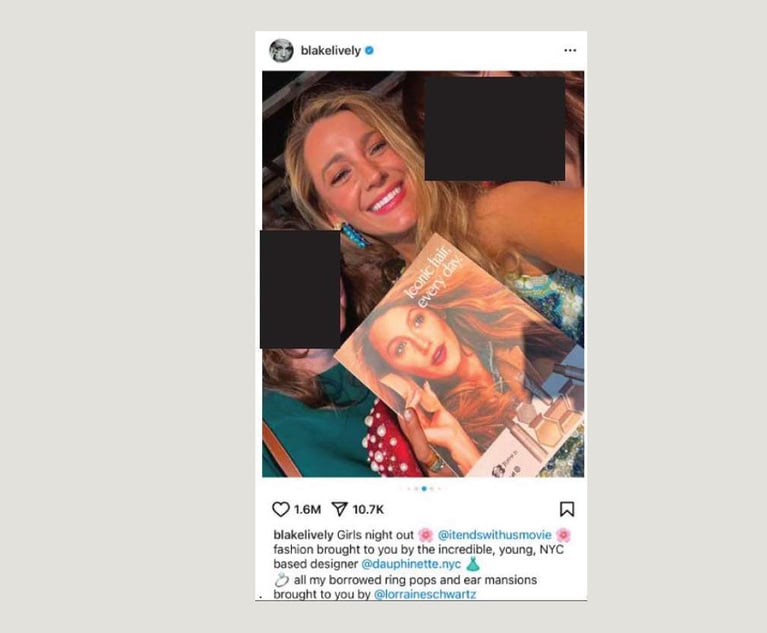'Vindicated': Defrauded GirlsDoPorn Models Awarded $12.8M
Website operators' fraud and deceit caused plaintiffs to become "pariahs in their communities," Judge Kevin Enright said following a three-month trial.
January 02, 2020 at 06:50 PM
9 minute read
 Plaintiffs attorney Ed Chapin.
Plaintiffs attorney Ed Chapin.
A San Diego judge has handed a sweeping victory to the 22 women who accused operators of the GirlsDoPorn.com website of duping them into appearing in widely distributed pornography.
San Diego Superior Court Judge Kevin Enright issued a tentative decision Thursday finding that website operator Michael Pratt and others used fraud and deceit by falsely promising the women the videos would not appear online or in the United States.
Instead, "defendants' tactics have caused the videos to become common knowledge in plaintiffs' communities and among their relations and peers—the very thing that plaintiffs feared and that defendants expressly assured them would not happen," Enright wrote in a 187-page decision.
That led to "severe harassment, emotional and psychological trauma," including in many cases lost jobs, academic and professional opportunities, and family and personal relationships. They "had their lives derailed and uprooted," Enright wrote. "They have become pariahs in their communities."
He explicitly found each of the 22 plaintiffs to be credible, while criticizing the defendants for attacking and harassing the women and some of their attorneys in retaliation.
He is proposing to award $1 million in economic damages, $8.5 million in noneconomic damages and $3.3 million in punitive damages. Noneconomic damages ranged from $250,000 to $500,000 per plaintiff. Pratt, operations chief Matthew Wolfe, actor/recruiter Andre Garcia and numerous corporate entities would be jointly and severally liable.
Although plaintiffs had asked for much more—$450,000 to $2 million per plaintiff, plus 10 times that amount in punitive damages—Sanford Heisler Sharp partner Ed Chapin said he and his clients are very happy with the decision. "They are ecstatic. They feel vindicated. They've been through so much," Chapin said. "This is empowering for them."
"After using their multimillion-dollar business resources to wage a three-year war of attrition against innocent victims and their counsel, the reprehensible conduct of the defendants is finally exposed and they have been held accountable," co-counsel Brian Holm of the Holm Law Group in Encinitas, California, said in a written statement.
The plaintiffs' team also included Stokes O'Brien partner John O'Brien and Sanford Heisler associate Cara Van Dorn.
Pratt did not appear at the trial and is considered a fugitive from justice. He and several co-defendants are currently facing criminal charges of sex trafficking related to some of the same allegation in Doe v. GirlsDoPorn.com.
Panakos Law partner Aaron Sadock and Daniel Kaplan of the Law Offices of Daniel A. Kaplan, who represented Pratt, Wolfe and the entities that operate GirlsDoPorn, said via email that "we are weighing our client's options, which include filing objections to the court's tentative statement of decision and an appeal if the decision becomes final." Enright has given both parties 15 days to file objections.
"At this point our clients are focused on defending themselves against the criminal charges in Federal Court in San Diego," they added. "The tentative ruling does not affect the criminal case. The government's burden of proof in the criminal case is 'beyond a reasonable doubt,' which is a much higher standard than in this civil lawsuit where the burden of proof is a mere preponderance of the evidence. The findings of fact in the civil case do not carry over to the criminal case where the government will have to prove the facts under a much more stringent standard."
Virtually none of Enright's findings of fact or conclusions of law were favorable to the defense.
Enright found that Pratt, Wolfe and Garcia used a "bait and switch" tactic of advertising clothed modeling jobs on Craigslist—something defendants said they did only because Craigslist refuses nude modeling ads.
When the women responded, they received offers to participate in a "legitimate adult gig" along with a promise that "none of your personal information will be given out in the video or afterwards." The plaintiffs testified credibly that they were told the videos would be limited to DVDs that would be sold overseas, Enright ruled.
The defendants offered to put the women in touch with models from former shoots, but in reality had paid those reference models to provide "false comfort that the experience is safe and enjoyable" and that the videos never appear online.
At the trial, four reference models "admitted to lying to prospective models such as the plaintiffs in this action even though, by telling the truth, they implicated themselves in a fraudulent scheme." One of the reference models, Amberlyn Clark, is among those who've been criminally charged.
The plaintiffs can't be faulted for failing to be more diligent, Enright ruled. "Defendants' use of aliases and other business names and websites ensured that a prospective model who checked defendants' reputations on the internet would not learn that they owned and operated a popular website called GirlsDoPorn and that their videos were strewn across dozens of other websites," he wrote.
The defendants had argued that the plaintiffs all voluntarily signed contracts releasing the rights to their video for use in any format. But Enright found the defendants waited until just before the video shoots began, then presented the contracts and pressured the women to sign them immediately. "More often than not, Garcia offers alcohol and/or marijuana to the model, regardless of her age, before the shoot and encourages her to drink or smoke in order to calm her nerves and loosen up," Enright found.
The contracts were filled with "dense and ambiguous language," including one 140-word paragraph that Enright called "a grammatical labarynth." The contract covers "photographs, pictures or portraits" and printed material. "It does not, however, mention GirlsDoPorn.com, nor the words 'internet,' 'online,' or 'website,'" Enright wrote. "It is thus designed to obscure what will actually be done with the videos and to encourage continued reliance on defendants' repeated representations, promises, and testimonials from hired 'references.'"
That rendered them invalid and unenforceable—"part and parcel of defendants' fraudulent scheme," Enright wrote.
Afterward, the defendants published the videos on GirlsDoPorn, a paid subscription website, plus promotional portions of them on popular free "tube" sites such as Pornhub.com.
The plaintiffs contended at trial that the defendants deliberately leaked the plaintiffs' true identities and personal information. including by sending the videos directly to the models' friends, family members, classmates, employers and social media contacts. The defendants insisted this was not true, that internet "trolls" had tracked down the women through their social media presences.
In the end, Enright ruled it didn't matter. "The court finds that defendants knew at the time they recruited each and every plaintiff that this result was inevitable," he wrote. "At best, defendants knowingly stood by while this happened, in order to increase website traffic and corresponding profits, while falsely assuring models that this nightmare scenario could never occur. At worst, defendants encouraged and facilitated this outing process and even participated directly."
After the plaintiffs identified in court as Jane Doe 1 hired attorneys and threatened to sue, she testified that her sex video was sent to dozens of students, professors, and administrators at her law school. "While defendants deny they had anything to do with this harassment, the record indicates that it is more likely than not that they were behind the harassment," Enright concluded. "The court finds that Pratt, disguised as 'Taylor Ann Fairchild,' personally took action to spread Jane Doe l's video to important people in her life," including her employer, her college soccer coach and her sister. "The same Ann Fairchild account also contacted Jane Doe 21 's mother revealing the video."
Enright also found that the defendants paid one of their producers' girlfriends $300 a week to telephone the plaintiffs' attorneys, "as many times a day as possible, at all hours, in order to pester them and subsume their time."
While finding each of the 22 plaintiffs credible, Enright found that Matthew Wolfe, the only individual GirlsDoPorn defendant who appeared at the trial, "provided guarded, and at times inconsistent testimony."
The decision orders the defendants to remove the videos from the GirlsDoPorn website and elsewhere from the internet. It does not block Pratt and others from continuing to operate GirlsDoPorn.com. But it does require that any future prospective models be sent contracts at least five days in advance of shooting that clearly state the videos will appear on GirlsDoPorn.com or on free internet website.
Each plaintiff was awarded actual damages $46,000—the stipulated value of the videos. Damages for emotional distress ranged from $500,000 for Jane Doe No. 1, an attorney who says the videos have ruined her career, to $250,000 for Jane Doe No. 5, who was 17 years old when she first communicated with the defendants and who later appeared participated as a background actor in an adult film made by a different production company.
Read more:
GirlsDoPorn Operations Chief Says He Never Made DVD-Only Promise
GirlsDoPorn Argues That Law Grad's Jet-Setting Instagram Counters Claims of a Ruined Life
4 Years Later, Law Grad Suing GirlsDoPorn Says She's Still Being Harassed
In GirlsDoPorn Trial, Jane Doe Law Grad Emerges as Central Figure
Daily Dicta: 22 Women Who Say They Were Duped Into Making Porn Videos Head to Trial
This content has been archived. It is available through our partners, LexisNexis® and Bloomberg Law.
To view this content, please continue to their sites.
Not a Lexis Subscriber?
Subscribe Now
Not a Bloomberg Law Subscriber?
Subscribe Now
NOT FOR REPRINT
© 2025 ALM Global, LLC, All Rights Reserved. Request academic re-use from www.copyright.com. All other uses, submit a request to [email protected]. For more information visit Asset & Logo Licensing.
You Might Like
View All
Justin Baldoni Sues Blake Lively and Ryan Reynolds for $400M in New Step in 'It Ends With Us' Fight
6 minute read
Patreon Hit With Lawsuit for Allegedly Diverting Subscriber Data to Meta

Music App Denied Injunction Against Apple Over Alleged Scheme to Block Its Access to App Store

$15K Family Vacation Turned 'Colossal Nightmare': Lawsuit Filed Against Vail Ski Resorts
Law Firms Mentioned
Trending Stories
- 1Decision of the Day: Judge Dismisses Defamation Suit by New York Philharmonic Oboist Accused of Sexual Misconduct
- 2California Court Denies Apple's Motion to Strike Allegations in Gender Bias Class Action
- 3US DOJ Threatens to Prosecute Local Officials Who Don't Aid Immigration Enforcement
- 4Kirkland Is Entering a New Market. Will Its Rates Get a Warm Welcome?
- 5African Law Firm Investigated Over ‘AI-Generated’ Case References
Who Got The Work
J. Brugh Lower of Gibbons has entered an appearance for industrial equipment supplier Devco Corporation in a pending trademark infringement lawsuit. The suit, accusing the defendant of selling knock-off Graco products, was filed Dec. 18 in New Jersey District Court by Rivkin Radler on behalf of Graco Inc. and Graco Minnesota. The case, assigned to U.S. District Judge Zahid N. Quraishi, is 3:24-cv-11294, Graco Inc. et al v. Devco Corporation.
Who Got The Work
Rebecca Maller-Stein and Kent A. Yalowitz of Arnold & Porter Kaye Scholer have entered their appearances for Hanaco Venture Capital and its executives, Lior Prosor and David Frankel, in a pending securities lawsuit. The action, filed on Dec. 24 in New York Southern District Court by Zell, Aron & Co. on behalf of Goldeneye Advisors, accuses the defendants of negligently and fraudulently managing the plaintiff's $1 million investment. The case, assigned to U.S. District Judge Vernon S. Broderick, is 1:24-cv-09918, Goldeneye Advisors, LLC v. Hanaco Venture Capital, Ltd. et al.
Who Got The Work
Attorneys from A&O Shearman has stepped in as defense counsel for Toronto-Dominion Bank and other defendants in a pending securities class action. The suit, filed Dec. 11 in New York Southern District Court by Bleichmar Fonti & Auld, accuses the defendants of concealing the bank's 'pervasive' deficiencies in regards to its compliance with the Bank Secrecy Act and the quality of its anti-money laundering controls. The case, assigned to U.S. District Judge Arun Subramanian, is 1:24-cv-09445, Gonzalez v. The Toronto-Dominion Bank et al.
Who Got The Work
Crown Castle International, a Pennsylvania company providing shared communications infrastructure, has turned to Luke D. Wolf of Gordon Rees Scully Mansukhani to fend off a pending breach-of-contract lawsuit. The court action, filed Nov. 25 in Michigan Eastern District Court by Hooper Hathaway PC on behalf of The Town Residences LLC, accuses Crown Castle of failing to transfer approximately $30,000 in utility payments from T-Mobile in breach of a roof-top lease and assignment agreement. The case, assigned to U.S. District Judge Susan K. Declercq, is 2:24-cv-13131, The Town Residences LLC v. T-Mobile US, Inc. et al.
Who Got The Work
Wilfred P. Coronato and Daniel M. Schwartz of McCarter & English have stepped in as defense counsel to Electrolux Home Products Inc. in a pending product liability lawsuit. The court action, filed Nov. 26 in New York Eastern District Court by Poulos Lopiccolo PC and Nagel Rice LLP on behalf of David Stern, alleges that the defendant's refrigerators’ drawers and shelving repeatedly break and fall apart within months after purchase. The case, assigned to U.S. District Judge Joan M. Azrack, is 2:24-cv-08204, Stern v. Electrolux Home Products, Inc.
Featured Firms
Law Offices of Gary Martin Hays & Associates, P.C.
(470) 294-1674
Law Offices of Mark E. Salomone
(857) 444-6468
Smith & Hassler
(713) 739-1250






